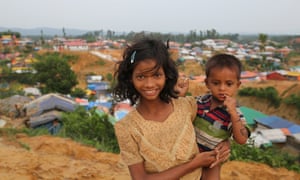
UN authorities have censured an arrangement struck among Myanmar and Bangladesh to begin repatriating Rohingya displaced people, with the UN evacuee office affirming they have not been counseled about the arrangement.
Bangladesh and Myanmar government authorities reported for the current week they had struck an "exceptionally solid" repatriation bargain for the arrival of the 720,000 Rohingya exiles who fled a ruthless military crackdown in August 2017, which would start by "mid-November".
Myanmar authorities said on Wednesday they had confirmed 5,000 Rohingya evacuees up until now, with the "main bunch" of 2,000 to be repatriated in the following month.
Be that as it may, Stéphane Dujarric, a representative for the UN secretary general, António Guterres, said the arrangement had taken the UN high magistrate for evacuees (UNHCR) off guard.
"To be clear … UNHCR, or, in other words on the issues of displaced people, was not counseled on this issue," said Dujarric at the day by day squeeze instructions given by the secretary general's office.
Chris Melzer, the UNHCR's senior outer officer situated in Cox's Bazar, Bangladesh, repeated this, saying: "UNHCR was not involved with that assention.
"We would exhort against forcing any timetable or target figures for repatriation in regard of the willful nature and manageability of return," included Melzer. "It is vague if displaced people know their names are on this rundown that has been cleared by Myanmar. They should be educated. They additionally should be counseled on the off chance that they will return ... It is important that profits are not hurried or untimely."
A huge number of Rohingya have been living in cramped exile camps in Cox's Bazar for over a year subsequent to escaping assault, murder and pyromania in Rakhine state because of the Myanmar military.
The Myanmar government consented to an arrangement with the UNHCR in June that they would work with the UN to make "sheltered and stately" conditions for the arrival of the Rohingya to Rakhine, including ensuring security, opportunity of development and pathway to citizenship. None of these confirmations have been made by the Myanmar government up until this point and the UNHCR has just been given limited access to Rakhine state.
"For UNHCR, the conditions in Rakhine state are not yet favorable for an arrival to Myanmar," said Dujarric. "What's more, in the meantime, we're seeing Rohingya exiles keep on touching base from Rakhine state into [Bangladesh], which should give you a sign of the circumstance on the ground."
Bangladesh has given Myanmar a rundown of 24,342 evacuees whom they have cleared for repatriation, however points of interest of the coordinations and exact date of the repatriation are indistinct. The issue of assent and conceivable constrained repatriation has additionally been raised, with Rohingya in Cox's Bazar saying they were frightful of returning and had never been requested that whether they needed return.
Myanmar authorities, including Myint Thu, the lasting secretary at Myanmar's service of outside issues, visited the camps in Cox's Bazar on Wednesday and were welcomed by many Rohingya protestors who held notices requesting citizenship and security. "We are here to meet with the general population from the camps so I can clarify what we have arranged for their arrival and after that I can tune in to their voices," said Myint Thu.
Safiullah, who like numerous other Rohingya utilizes one name, was among the outcasts who met the Burmese individuals from the Bangladesh-Myanmar joint working gathering at Kutupalong displaced person camp on Wednesday.
"The Burmese authorities said to us that around 4,600 Rohingya exiles would be taken to Myanmar," said Safiullah. "The principal group, around 2,300, would be permitted to return now. The staying half would return at a later stage, they let me know. The returnees need to burn through three days in a travel camp inside Rakhine before they are taken to another camp which will be their new home."
He had asked whether the Rohingya would have the capacity to come back to their very own towns and get back their appropriated land and different properties however "the Burmese authorities did not give me an answer".
"I won't come back to Myanmar regardless of whether the specialists enroll me for repatriation. I am certain this is the perspective of all Rohingya evacuees in Bangladesh," he said.
A few onlookers have portrayed the declaration as politically propelled by the PM of Bangladesh, Sheik Hasina, in front of the general race which will be held toward the finish of December. While Bangladesh at first respected the displaced people escaping the military crackdown, a year on their quality has turned into a politically hostile issue, and there is expanding weight on Hasina to begin their repatriation at the earliest opportunity.
Suktara Begum, a Rohingya outcast lady who addressed Myint Thu on his visit to the camps, stated: "They came to meet us today just due to weight from the universal network. They have not made one move to meet our requests in such a large number of months. They are not genuine about our arrival to our homes. We don't confide in them."
0 comments:
Post a Comment